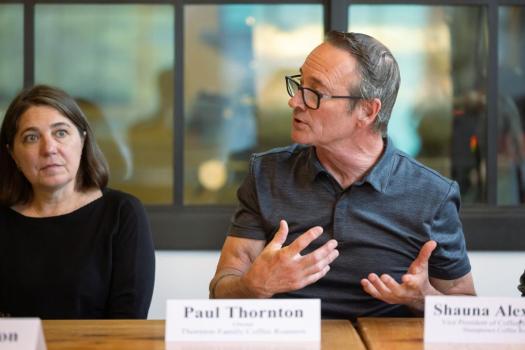U.S. Rep. Bonamici hears buzz about tariffs from Beaverton coffee merchants
Published 10:25 am Friday, May 30, 2025
An array of metro-area people who roast or sell coffee met with U.S. Rep. Suzanne Bonamici, D-Beaverton, on Thursday, May 29, to talk about the impact of President Donald Trump’s 10% tariff on coffee beans and coffee-related supplies.
What she heard was uncertainty and fright due to the economic policies of the administration, but also some frustration aimed at Democrats for not doing more.
“Right now, I feel as if my representatives aren’t doing anything,” said Enrique Sánchez-Rivera, owner of Love Preferred Coffee Co. in Northeast Portland.
The purpose of a congressional roundtable is to get people’s comments to elected officials. But Ben Reese, owner of Beaverton’s Lionheart Coffee, said he needed to hear comments from the others as well.
“This whole thing with the tariffs? What’s it mean to us? To our customers?” he asked. “This meeting was good for that. Just to hear that others are seeing the same thing as I am. Even to hear they’re just as scared as I am was good.”
Lionheart has two coffee shops in Beaverton, on Watson Avenue and Scholls Ferry Road.
When the comments to Bonamici got a little acrimonious, regarding Democrats and the administration, Ian Williams, owner of Deadstock Coffee, took it with a grain of salt.
“Portland has a brand. That brand is: We like to fight,” he said with a wry grin. “But what are we fighting for? Portlanders sometimes spend little time learning what the issues are that they’re fighting about.”
Williams has coffee shops in Beaverton and in Portland.
Most of the business people taking part in a roundtable discussion with Bonamici represent small businesses. They say a 10% increase in the cost of the beans and equipment they import are a burden on their companies. And, for the most part, have to be passed on to consumers.
“I’ve been buying coffee for 40 years and I’ve never had to worry about tariffs,” said Paul Thornton, owner of Thornton Family Coffee Roasters in Beaverton.
He said he sells coffee to restaurants based on bean prices that he paid, or expected to pay, many months earlier. “We have to be able to tell customers, ‘Here’s the price of our beans for the next 12 months, or maybe six months.’ And with these tariffs, we can’t do that.”
He added, “I’m having very awkward conversations with customers I’ve already sold coffee, too.”
Jobs? What jobs?
One of the arguments for tariffs is as an incentive to move an industry to the United States. Take, as an example, solar panels. Congress might put a tariff on Chinese solar panels (and it has), making them more expensive, which encourages companies to buy U.S.-made panels, which increases jobs.
One level of frustration at the Thursday roundtable is there are almost no coffee beans grown in the United States. Only a minuscule amount comes from Hawaii and Puerto Rico. All of the rest of the world’s coffee comes from a narrow band of lands near the equator.
“This isn’t about U.S. jobs,” said Emily Smith, relationship representative with Hacea Coffee Source, which connects coffee growers overseas with coffee roasters here. “These tariffs will kill U.S. jobs. It’ll do that by closing small coffee shops. That coffee shop where people had their first date. Where they held business meetings. Where they stayed up late studying for school,” she said.
Bonamici referred to President Trump’s on-again-off-again tariffs as “chaotic and outrageous.”
And she’s knowledgeable about the crafting of tariffs. That’s because she sat on the congressional work group that helped craft the United States-Mexico-Canada Agreement, or USMCA, in 2020. That trade agreement between the three countries modernized the old North America Free Trade Agreement, or NAFTA.
“It took a lot of work. It took a lot of time. And then it went to Congress. Because that’s the way trade agreements are done,” she said.
Trump has removed Congress from the process, imposing, then scuttling, his own tariffs via executive order. Courts recently have ruled on that.
“These are not normal times,” Bonamici said.
Democrats get heat
Even if Trump hadn’t bypassed Congress on tariffs, Democrats got shellacked in last year’s general election, losing the White House and Senate and failing to win back the House of Representatives.
But some of the coffee businesspeople at the round table were still unhappy with how little the opposition has done to stymie the administration.
“We’re just not seeing the pressure of (Democrats) to these policies. It’s like you’re waiting for something catastrophic to happen,” said Mark Stell, managing partner of Portland Coffee Roasters.
“This is not a conservative versus liberal thing,” he added. “This is big businesses and small businesses all getting hurt.”
Sánchez-Rivera of Love Preferred agreed: “These mandates are coming from bullies. I’m not saying we should break the law, but we have to be aggressive.”
Bonamici said town halls like this are helpful because she can take the information she hears back to her House Democratic Caucus. “And if tariffs come back to Congress, Democrats will be able to be more involved,” she added.
Cassy Gleason, owner of Marigold Coffee and Buckman Coffee Factory — which hosted the roundtable — agreed that events like this, and hearing from small business owners, is helpful.
“We’re mostly small businesses but coffee, nationwide, is a huge industry. We have leverage,” she said. “Maybe it’s time for us to wake people up … in a different way than we always have.”
Court rulings continue
The issue became complicated when a three-judge panel at the New York-based U.S. Court of International Trade on Wednesday blocked Trump from wide-ranging tariffs on imports under an emergency-powers law. The ruling followed several lawsuits arguing Trump’s “Liberation Day” tariffs exceeded his authority and left the country’s trade policy dependent on his whims.
Oregon was a plaintiff in at least one of those suits.
“The Worldwide and Retaliatory Tariff Orders exceed any authority granted to the President by IEEPA to regulate importation by means of tariffs,” the court wrote, referring to the 1977 International Emergency Economic Powers Act, which Trump has used as his authority in creating sweeping tariffs on virtually all international imports.
Bonamici predicted that all rulings on tariffs will end up at the U.S. Supreme Court. But not necessarily this session, which is expected to begin its summer recess in late June or early July, returning in October.
Oregon Sen. Ron Wyden, top Democrat on the Senate Finance Committee, said the tariffs had “jacked up prices on groceries and cars, threatened shortages of essential goods and wrecked supply chains for American businesses large and small,” according to the Associated Press.
On Thursday, May 29, a second federal court also ruled against Trump’s emergency tariffs on imports from around the world, dealing yet another blow to his trade agenda.







